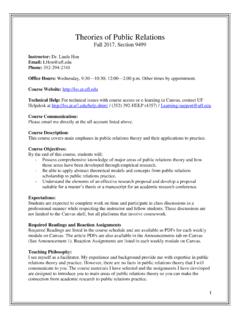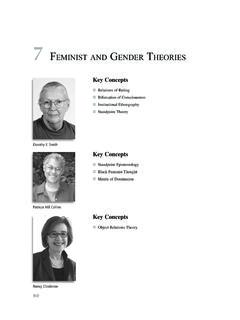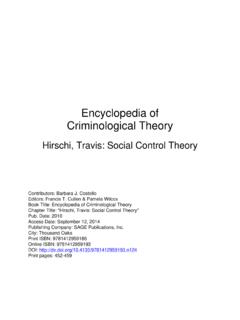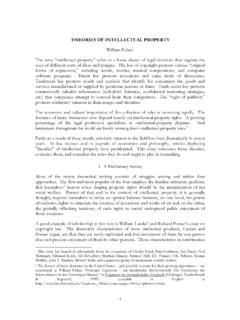Transcription of Bachelor of Social Work (BSW) Field Learning Contract
1 ASU SSW BSW Learning Contract ( ) Page 1 School of Social Work Bachelor of Social Work (BSW) Field Learning Contract Please Type or Print: Student: Dates of Placement: Agency: Field Instructor: Task Instructor (if applicable): Field Liaison: Signatures: (Must have all original signatures on this page before submitting Learning Contract .) Student: _____ Date: _____ Field Instructor: _____ Date: _____ Task Instructor (if applicable): _____ Date: _____ Field Liaison: _____ Date: _____ ASU SSW BSW Learning Contract ( ) Page 2 School of Social Work Field Instructor/ Field Student Supervision Agreement Student Name Field Instructor Task Instructor Field Agency Dates of Field Instruction Academic Yr: August Yr_____ through May Yr_____ or Summer Block Yr_____ or Other: Supervision Time (ASU SSW Policy requires one hour of supervision per Week.)
2 Supervision will occur as follows: Day of week: Agreement on holidays, winter break, and spring break. What is the agreement for coverage during school breaks? Conflict Resolution Procedure Please refer to the ASU Social Work Field Education Policy SWK 715. Supervision Formats to be used. Check all that apply. Either check with ink pen or point and click with electronic cursor One on One supervision Group supervision Co-facilitation with task instructors E-mail communication Telephone communication Audio/Video/Process recording ASU SSW BSW Learning Contract ( ) Page 3 Educational Policy -- Core Competencies Competency-based education is an outcome performance approach to curriculum design. Competencies are measurable practice behaviors that are comprised of knowledge, values, and skills.
3 The goal of the outcome approach is to demonstrate the integration and application of the competencies in practice with individuals, families, groups, organizations, and communities. The ten core competencies are listed below [EP EP (d)], followed by a description of characteristic knowledge, values, skills, and the resulting practice behaviors that may be used to operationalize the curriculum and assessment methods. DIRECTIONS: In each category choose two activities and create a student choice activity. Every activity must have an evaluation criteria and a target date. #1 Professional Values and Ethics Educational Policy -- Apply Social work ethical principles to guide professional practice. Social workers have an obligation to conduct themselves ethically and to engage in ethical decision making.
4 Social workers are knowledgeable about the value base of the profession, its ethical standards and relevant law. Learning Objective: The student will identify, in practice situations, major values that both support and challenge his/her personal and professional practice of Social work. The student will demonstrate compliance with the NASW Code of Ethics. Practice Behavior: 1. Recognize and manage personal values in a way that allows professional values to guide practice. 2. Make ethical decisions by applying standards of the National Association of Social Workers Code of Ethics and, as applicable, of the International Federation of Social Workers/International Association of Schools of Social Work Ethics in Social Work, Statement of Principles. 3. Tolerate ambiguity in resolving ethical conflicts. 4. Apply strategies of ethical reasoning to arrive at principled decisions.
5 Learning Activities: Student to complete two activities and create a student choice activity. 1. Student will interview 2 agency staff members on how they identify, address and resolve ethical dilemmas. 2. Student will demonstrate ability to identify 2-3 ethical dilemmas when working with agency clients and debrief with Field /task instructor on how Social workers address the dilemmas. 3. Student will identify personal values and perceptions about culture and class that influence Social work practice. 4. Student Choice Target Dates 1. Month/Year 2. Month/Year 3. Month/Year Evaluation Criteria: 1. The student will identify three strategies for addressing ethical dilemmas and report back to Field instructor. 2. The student will debrief with Field instructor on values and perceptions that conflict/support with work with clients.
6 3. The student will discuss own awareness regarding self-perceptions during weekly supervision. 4. Student Choice Evaluator: ASU SSW BSW Learning Contract ( ) Page 4 #2 Professional Relationship Skills and Professional Roles Educational Policy Identify as a professional Social worker and conduct oneself accordingly. Social workers serve as representatives of the profession, its mission, and its core values. They know the profession s history. Social workers commit themselves to the profession s enhancement and to their own professional conduct and growth. Learning Objective: The student will engage in appropriate and effective communications skills with communities, stakeholders, partnering agencies, clients, supervisors, staff and systems of all sizes. The student will demonstrate professional use of self.
7 The student will use supervision and consultation appropriately. The student will demonstrate awareness of various professional roles necessary in practice, , advocate, broker, case manager, community organizer. Practice Behaviors: 1. Advocate for client access to the services of Social work. 2. Practice personal reflection and self-correction to assure continual professional development. 3. Attend to professional roles and boundaries. 4. Demonstrate professional demeanor in behavior, appearance and communication. 5. Engage in career-long Learning . 6. Use supervision and consultation. Learning Activities: Student to complete two activities and create a student choice activity. 1. Student will observe two staff members in the provision of agency services to learn about various Social work roles. 2. Student will actively participate in a professional or student Social work organization to gain awareness with various Social work roles necessary in skill based practice.
8 3. Maintain a reflection journal to chronicle internship experiences and share with Field instructor during supervision. 4. Student Choice Target Dates 1. Month/Year 2. Month/Year 3. Month/Year Evaluation Criteria: 1. Student will describe Social work roles to Field instructor during supervision. 2. The student will provide his/her Field instructor with regular updates on activities with the professional or student organization. 3. The student will review journal entries weekly with Field instructor. 4. Student Choice Evaluator: #3 Responsiveness to a Multicultural Society Educational Policy -- Engage diversity and difference in practice. Social workers understand how diversity characterizes and shapes the human experience and is critical to the formation of identity. The dimensions of diversity are understood as the intersectionality of multiple factors including age, class, color, culture, disability, ethnicity, gender, gender identity and expression, immigration status, political ideology, race, religion, sex, and sexual orientation.
9 Social workers appreciate that, as a consequence of difference, a person s life experiences may include oppression, poverty, marginalization, and alienation as well as privilege, power, and acclaim. Learning Objective: The student will practice without discrimination and with respect, knowledge, and skills related to clients: age, class, color, culture, disability, ethnicity, family structure, gender, marital status, national origin, race, religion, sex, and sexual orientation, particularly as it relates to populations of the Southwest. ASU SSW BSW Learning Contract ( ) Page 5 Practice Behaviors: 1. Recognize the extent to which a culture s structures and values may oppress, marginalize, alienate, create or enhance privilege and power. 2. Gain sufficient self-awareness to eliminate the influence of personal biases and values in working with diverse groups.
10 3. Recognize and communicate their understanding of the importance of difference in shaping life experiences. 4. View themselves as learners and engage those with whom they work as informants. Learning Activities: Student to complete two activities and create the student choice activity. 1. Student will conduct two key informant interviews with community organizers to learn culturally grounded approaches in working with a diverse community. 2. Design a specific case intervention that demonstrates the application of culturally responsive service delivery for an assigned client. 3. Student will identify agency population and discuss how best practices interventions are culturally responsive to population served. 4. Student Choice Target Dates 1. Month/Year 2. Month/Year 3. Month/Year Evaluation Criteria: 1.








